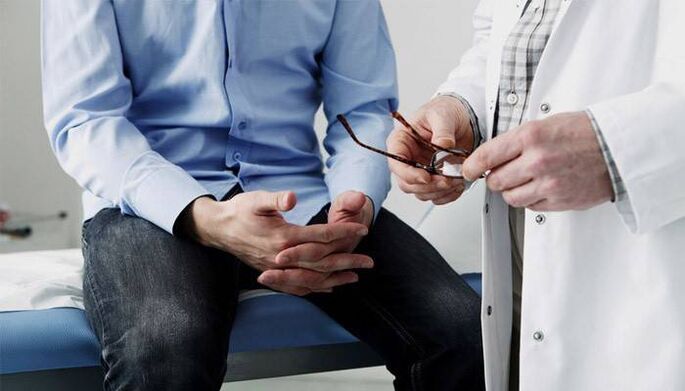Main drug classes and their mechanisms of action

- Androgens - This active substance, contained in many medications for the treatment of prostatitis, helps improve detrusor muscle tone, thereby significantly improving urination.
- Progesterone - Doctors call this an anti-androgen. The use of drugs in this group can help shrink adenomas and reduce pain in patients. It is recommended to combine them with special procedures: prostate massage, electrophoresis, ultrasonic electrophoresis.
- Herbal based anti-inflammatory medicine for prostatitis. Although they are not considered the most effective, they have powerful antiseptic properties. Among the herbs in the composition, particularly noteworthy are sage, coltsfoot, chamomile, dill, parsley and nettles.
Best Drugs for Prostatitis and Prostate Adenoma
- Prostatitis suppositories. They improve blood circulation and have antiseptic and anesthetic properties. They are often prescribed as part of a course of treatment, along with medications or physical therapy. The candle does not have a very pleasant smell, but this does not affect the effect on the skin. The drug has no contraindications.
- Propolis suppository. They can relieve pain during urination and have anti-inflammatory properties. A huge advantage of this candle is the price – they are budget-friendly. In addition, the drug does not cause any side effects and therefore can be used as a preventive agent.
- Additionally, suppositories help relieve swelling and inflammation while normalizing prostate function. Suitable for treatment of advanced stages.
- Popular suppositories used to treat prostatitis. They are used in the treatment of complicated prostatitis and have potent anti-inflammatory effects. However, many contraindications prevent every patient from using this drug.
- Anti-inflammatory drugs - used to treat acute adenomas and relieve pain during urination. Such medications help cure prostatitis quickly and prevent the disease from becoming chronic.
- Antispasmodics - This group of pills relieves spasms and relaxes muscles, thereby significantly improving blood circulation.
- Antibiotics - such tablets are prescribed if the prostate adenoma is caused by an infectious lesion of the gland and the bacteria causing the disease are found. Only the doctor who performs the exam can determine which prostatitis antibiotic is right for you. Antibiotics are given along with rectal medications.
injection
Instillation
Effective herbal remedies
When is medication needed?
Indications for drug therapy
- No renal complications
- Unable to perform operation
- The adenoma developed again after surgical treatment.
Medical therapy is carried out at the initial stage of pathological development, when functional impairment is minimal and there are no complications affecting renal function. There are contraindications to surgical treatment: advanced age of the patient and condition of the cardiovascular system.
Contraindications
- Severe urinary problems.
- Residual urine volume exceeds 100 ml.
- Acute urinary retention.
- hematuria.
- Bladder stones.
Until recently, the mainstay of treatment for male ailments was surgery. With the advancement of medical treatment, only 20% of men receive surgical treatment, and the rest receive effective medical treatment.
Drugs to treat adenomas
- alpha-blockers;
- Antibacterial agents;
- 5-alpha reductase inhibitor;
- Hormone drugs;
- Herbal remedies.
When are antibiotics needed?
alpha blockers
Medications from the adrenergic blocking group can quickly resolve symptoms. But they do not affect the pathological process itself. They are most effective against mild prostate enlargement. Men with severe urinary tract disease and genitourinary infections do not need to take alpha-blockers.
possible side effects
- Headache.
- Stuffy nose.
- Digestive system diseases.
5-alpha reductase inhibitor
Possible side effects are related to inhibition of sexual function, weakened erections, and decreased sperm production. After taking the medicine, the negative effects disappeared and the man's sexual function was completely restored.
herbal preparations
The effect of herbal medicine
- Inhibits prostate cell growth factors.
- Blocks androgen receptors.
- Inhibits the action of enzymes involved in hormone metabolism.
- Effects on tissue growth factors.
Today, herbs are available in convenient forms; they are often available both as stand-alone treatments when mild effects are needed, and as part of complex treatments.
Homeopathic medicines used to treat genitourinary disorders
What medicine should be taken to treat prostatitis?
- Efficacy against the greatest number of symptoms (pain, urodynamic disturbances, tissue swelling, decreased libido and sexual performance);
- Proprostatic function (restores and protects prostate cells from risk factors - inflammation, hypothermia, infection, age-related changes);
- Compatibility with other drugs;
- Safe and without serious side effects;
- Minimum limits to use.
Review and explanation of the most effective drugs for treating prostatitis
- Urinary tract disorders (difficulty urinating);
- Pathological tissue proliferation.
























